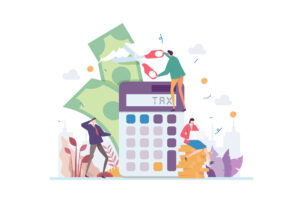What Do You Do When You Owe Taxes But Don’t Have the Funds?
For many people tax season brings the joy of a nice big refund to go out and splurge on something they’ve had your eye on for a long time. On the flip side of the equation are those people who surprisingly, or not, end up owing the IRS money. Not only do these people miss out on the extra cash influx, but they also have to come up with the funds to pay off the extra tax bill.
For some people, depending how high the bill is, they could have to pay even more than just the shortage amount. That’s because many times when people underpay they end up owing penalties for the underpayment. For those who owe a lot of money, those penalties could end up being huge. In fact, the penalties can even be much higher than the shortage.
That’s why it’s always best to try to avoid owing any money to the IRS, especially if you don’t have the funds to pay it off when the tax bill comes due. So what happens to people who can’t pay their tax bill? You do have a few options.
In some cases, it might be a good idea to take out a loan or a line of credit in order to pay off the bill. Of course, you will then be responsible to pay off the loan, so use caution. Another option is to apply for an extension with the IRS. This could buy you a little time to come up with the needed funds. If you need even more time then try applying for a hardship extension, which could give you up to six months to pay it off. You could also ask the IRS for permission to set up a payment plan to pay off the debt in installments.
Whichever path you decide to take, make sure you do something. Don’t ignore the problem or it will only get worse. The penalties will likely increase the longer you wait and the IRS could eventually take other measures or even press charges. So the bottom line is: do something.
Insanity
Insanity Transcript: So, you’re saying it’s ok. Insanity, is a side-effect of tax law. To receive our free newsletter, contact us here. Subscribe our YouTube Channel for more updates. This transcript was generated by software and may not accurately reflect exactly what was said. Alan Olsen, is the Host of the American Dreams Show and the Managing Partner…
Alan L. Olsen, CPA, MBA(tax)
Alan L. Olsen, CPA, MBA (Tax) Managing Partner Alan is managing partner at Greenstein, Rogoff, Olsen & Co., LLP, (GROCO) and is a respected leader in his field. He is also the radio show host to American Dreams. Alan’s CPA firm resides in the San Francisco Bay Area and serves some of the most influential…
Car Collections: Collectors, Investors, or Dealers Status
Car Collections: Collectors, Investors, or Dealers Status Recently a 1936 Bugatti sold for over $30 million. Granted, that’s the world’s most expensive car, and one of only three ever built, but it raises an important financial question for car collectors. While acquiring beautifully restored antique cars may be someone’s high-octane passion, the IRS could see…
Feds and States Secretly Raising Tax Revenues
Feds and States Secretly Raising Tax Revenues Is the Administration out raising taxes without congressional approval? The surprising answer is a resounding YES. Receiving that notice that you are being audited strikes fear in the hearts of most people. For many, these tough economic times are about to get worse. Tax professionals from across the…



